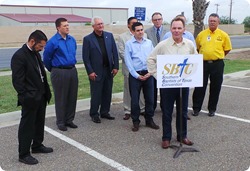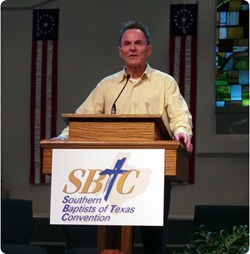Archive for July, 2014
The Border Crisis in Texas Personalized
The news stories and pictures of the border crisis in Texas all became personalized for me on Tuesday. The children and young people we saw are real children and real young people. We saw children from seven to seventeen years of age, from the countries of Honduras, Ecuador, El Salvador, Guatemala, and Mexico.
 On Friday, July 11, I issued a Call to Prayer: Responding to the Crisis on the Texas Border, and addressed the border crisis as President of the Southern Baptist Convention. When I was called upon to accompany Dr. Russell Moore, President of the Ethics and Religious Liberty Commission, and Dr. Jim Richards, Executive Director of the Southern Baptists of Texas to the border of Texas, I cleared my calendar and joined them. Dr. Moore and I were together in McAllen, and Dr. Richards joined us in San Antonio. We were accompanied and escorted into these places by Mr. Ali Noorani, the Executive Director of the National Immigration Forum.
On Friday, July 11, I issued a Call to Prayer: Responding to the Crisis on the Texas Border, and addressed the border crisis as President of the Southern Baptist Convention. When I was called upon to accompany Dr. Russell Moore, President of the Ethics and Religious Liberty Commission, and Dr. Jim Richards, Executive Director of the Southern Baptists of Texas to the border of Texas, I cleared my calendar and joined them. Dr. Moore and I were together in McAllen, and Dr. Richards joined us in San Antonio. We were accompanied and escorted into these places by Mr. Ali Noorani, the Executive Director of the National Immigration Forum.
What Did We Do?
We began yesterday morning by touring a Texas Border Patrol facility in McAllen, Texas. Within twenty hours of entering our country, children are brought to facilities like this and cared for until they are taken elsewhere, depending on their situation and physical condition. This facility has just been renovated and can facilitate the care of approximately 1,000 children. Following this forty-five minute tour, we held a press conference that was very well attended by the media.
 Then, we drove 270 miles to San Antonio, Texas. Upon arrival at Lackland Air Force Base, we toured the Health and Human Services Facility for migrant children, ages twelve through seventeen. This facility houses up to 1,200 young people. They are usually at this center less than one month before being assigned to their next location. Following this forty-five minute tour, we held another press conference for the media in San Antonio, as well as other media outlets that called into the conference.
Then, we drove 270 miles to San Antonio, Texas. Upon arrival at Lackland Air Force Base, we toured the Health and Human Services Facility for migrant children, ages twelve through seventeen. This facility houses up to 1,200 young people. They are usually at this center less than one month before being assigned to their next location. Following this forty-five minute tour, we held another press conference for the media in San Antonio, as well as other media outlets that called into the conference.
Due to flight schedules, we quickly headed to the San Antonio International Airport, and began to make our way home. Before boarding for my flight to Dallas, I was interviewed by no less than five media outlets from around the country. The attention the media is giving to this crisis tells us one thing: It is a major crisis in our nation.
What Did We See and Hear?
As I said earlier, the children we saw in McAllen were as young as seven years of age, and in San Antonio, the young people we saw were twelve to seventeen years of age. We have six grandchildren, of which the oldest is eight years of age. When I saw these little boys and girls, I thought of my granddaughter, Reese Caroline, who just turned seven. When I heard a seven year-old boy asked a question about his family and he stated, “I have no family”, my heart melted.
My mind immediately went to our Reese Caroline, who was the same age as this seven year-old boy, and our Parker, who will be seven years old in August, and I thought: I cannot imagine how a seven year-old child could leave his country in Honduras, Guatemala, Ecuador, El Salvador, or Mexico and make the trek here safely, ending up in McAllen, Texas. There is no way I can even think of our Peyton, Reese, Parker, Beckham, Jack, or Nora making the trek across a dangerous terrain, entering into a different country than their own. But friends, it is happening every day in this world.
Why are they doing this? Through translators, these children from age seven to seventeen told us why:
- A better life
- Fear of gangs
- Violence
- Human Trafficking
- Poverty
When conditions are bad enough, people will do anything. I stated in our San Antonio Press Conference: “People will go a long way and tackle obstacles when they feel that hope is possible. They are hoping for a better life.” Hope will drive even a child to pursue a better future. This is why gospel churches need to step up to this moment and present the powerful hope of the gospel of Jesus Christ.
What Do We Need to Do Now?
Yes, the border crisis is personalized. Now, I reflect upon the faces of these children and young people. Christ-followers, what do we do now?
1. Pray for the leaders of our nation diligently. We need to humbly call upon the leaders of our country to fix the immigration system in our nation. Since we have elected them to lead us, we need to pray for them to come together and agree upon what needs to be done in reforming our immigration system. I want to request that you lead your church to do the following: Next Sunday, ask your church to pray with you about this major crisis in our nation. We have done this for the past two Sundays in our fellowship.
2. Pastors, especially the pastors who lead churches located on the borders of our nation, lead your church to do whatever you can to demonstrate compassion to all immigrants, meeting their needs, and proclaiming the hope we have in Jesus Christ. The great news is that God is moving and changing the lives of many of these children and young people, as they are coming to know Jesus Christ personally. God is committed to bringing people unto Himself, so let’s get involved with what He is doing.
3. Prepare to engage in helping others through this crisis. I stated in our press conferences yesterday that our Southern Baptist churches are ready to help all persons in need if we are given the opportunity to do so. Many of our churches that are located on the border of Texas are doing as much as they are permitted to do to help right now; thanks to each of these pastors and churches as well as our Southern Baptist National Disaster Relief Ministry that was very involved in this crisis until they were no longer permitted. We pray for the open door in the future for all of us to be able to help.
For me, the border crisis is now personalized. I hope that after reading this and praying about it, it will become personalized for you.
Yours for the Great Commission,
Ronnie W. Floyd
Spectator vs. Ministry: Which One Results in Growth?
I enjoy sports, but I am a football fanatic.
There are sports fans and then there are sports fans! The first group is made up of those who buy a ticket, go to the game, watch the action, and cheer when their team makes a good play. After the game, they go home and go to work the next day.
The second group buys season tickets, goes to the game three hours early, cooks hotdogs on a tailgate grill, buys a hat, jersey, foam finger, and possibly paints themselves team colors to match the jersey. They cheer in the stands until the final play and, if their team wins, cannot wait to see the highlights and commentary on SportsCenter.
But even with all of that, they are not players. They remain fans.
There is No Such Thing as Spectator Members in the Church
Dr. Thom Rainer writes of this phenomenon: “I am a fan of the University of Alabama Crimson Tide. Notice I did not say I am a member of the Crimson Tide – there’s a difference. I don’t go to spring practices and work out with the team. I don’t study game films or discuss plays with the coaches. On game day, I don’t get on the field and help the team move the ball across the goal line. That’s not my job. I’m a fan – a spectator.”1
Spectator members are one of the biggest problems in churches today. Members are to minister, and all members are to minister. The Bible knows nothing of spectator church members. In order to move beyond spectator Christianity, it is important for every member to know his or her role in the church and do it.
Ministry is the Responsibility of Each Christ-Follower
The Apostle Paul reminded the Ephesian believers that God had established leaders in the church. Among these leaders are apostles, prophets, evangelists, pastors and teachers. He also established why these leaders had been given: “for the training of the saints in the work of ministry, to build up the body of Christ.”2 No one is being trained to look around; everyone is being trained to minister.
Ministry is the responsibility of every believer. A very significant part of ministry is that we are connected by the growth that takes place. Ministry is rarely, if ever, for the benefit of an individual. In fact, as Paul makes clear, the work of ministry leads to the building of the body of Christ. That body includes many members.
Paul continues with the extent of such ministry in verse 13, “Until we all reach unity in the faith and in the knowledge of God’s Son, growing into a mature man with a stature measured by Christ’s fullness.” Notice we are “growing into a mature man.” Ministry results in building, which results in unity as a result of growth.
Ministry Unifies, Connects, and Grows
Ministry unifies, connects, and grows the church. Ministry is a unifier and a connector. If you are a member of a church, pray for God to open a door of ministry opportunity for you. Talk to someone in leadership and ask them where your gifts, talents, and passions can best be used. You will be connected to other members of the body. You will grow, so will those you minister with, and God will be glorified.
Yours for the Great Commission,
Ronnie W. Floyd
Senior Pastor, Cross Church
General Editor, Bible Studies for Life
1– Bible Studies for Life, Connected, Dr. Thom Rainer
2– Ephesians 4:12 (HCSB)


